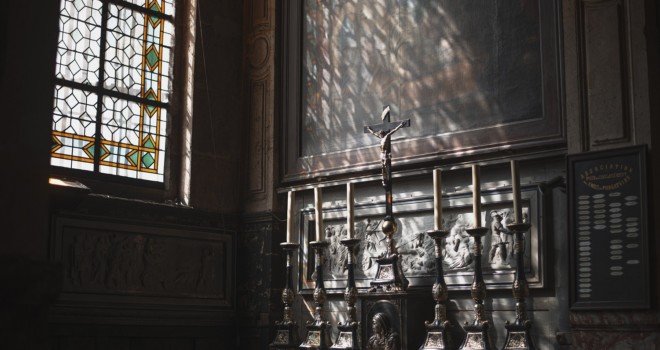The year was 1966. I was five years old. My father took my hand and walked me into St. Mary’s Church, our parish in upstate Newburgh, New York. The organ was playing a gorgeous hymn, and the choir was singing, in Latin, the accompanying song. The language was indecipherable to me, but the song made my heart leap. I had no idea why.
It was not until many years later that I discovered that the hymn was Adoro Te Devote, the stunning Eucharistic homage penned by Thomas Aquinas in 1227. Centuries after Aquinas’ death, Jesuit Gerard Manley Hopkins SJ (1844-1889) penned an English translation:
Godhead here in hiding, whom I do adore,
Masked by these bare shadows, shape and nothing more,
See, Lord, at thy service low lies here a heart
Lost, all lost in wonder at the God thou art.
The year now, of course, is 2020. I am 58 years old. I live in South Boston. It is noon, and the Angelus bells just rang out from our beloved Gate of Heaven Church. As I am called to prayer, I am also again called to memory, and at the sound of the bells my heart leaps once more. Again, I am reminded of my father, my childhood, the saints and angels and even those martyred for the faith. I recollect one evening when I entered my parents’ bedroom and discovered my Father on his knees in prayer. He held his black rosary in his hands, his lips moving to the mysteries. Concluding his ave, he kissed the beads once and tenderly placed them under his pillow. To see this man, this man who I believed could fight off lions on my behalf, humbly prostrate himself before God struck me to my very core. No catechism, no teaching, no bible or homily was ever as instrumental to the formation of my faith than this image of my father and that devoted kiss.
I once traveled to Prague. So many Catholic churches there were shut down, decimated by decades of past Communist rule. I visited museums and it devastated me to see chalices, stoles and ornate monstrances all placed inside glass display cases, disposed, unused and forgotten, reduced to mere relics. It occurred to me that I had a pressing, personal responsibility to make sure that the same thing didn’t occur in my own home parish. It occurs to me, now, that there is a real possibility, if we are not careful and vigilant, that our own churches run the risk of becoming concert halls and museums.
In this age of the coronavirus, these memories of hymns, rosaries and monstrances have come rushing back to me. It all makes particular sense, now. The Church is my inheritance and my personal responsibility. Why does the Faith sometimes bring me to tears and knock me to my knees? The answer: true Beauty will do that.
In August 2019, it was widely reported that, according to a Pew Research Center survey, only one-third of U.S. Catholics (31%) believe in Transubstantiation. The sublime mystery of the bread and wine actually becoming, at the moment of Consecration, the true Body and Blood of Jesus is rejected by seven-in-ten Catholics who now view Communion not as the Real Presence but rather a symbol. Reflecting on this sad reality, I am reminded of a remark made by the great Catholic writer Flannery O’Connor: “If it’s only a symbol, to hell with it.”
Let us, then, remain active and vigilant, lest our Church become a relic. Let us remain committed to a renewed and revived Catholicism. In spite of the lockdowns and countless church closings, some parishes remain open for limited Eucharistic Adoration. Let us avail ourselves of this beautiful reality. This is not a time for the Church to retreat. The battle is engaged. We are called to victory.
✠
Photo by Samantha Hurley from Burst












